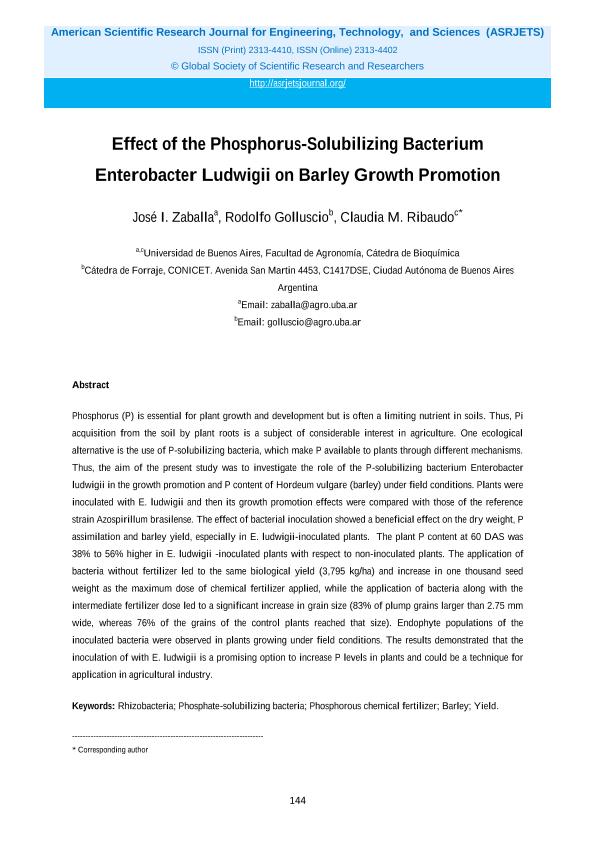Mostrar el registro sencillo del ítem
dc.contributor.author
Zaballa, José Ignacio
dc.contributor.author
Golluscio, Rodolfo

dc.contributor.author
Ribaudo, Claudia Mónica

dc.date.available
2022-09-13T18:28:10Z
dc.date.issued
2020-08
dc.identifier.citation
Zaballa, José Ignacio; Golluscio, Rodolfo; Ribaudo, Claudia Mónica; Effect of the phosphorus-solubilizing bacterium Enterobacter ludwigii on barley growth promotion.; Global Society of Scientific Research and Researchers; American Scientific Research Journal for Engineering, Technology, and Sciences; 63; 8-2020; 144-157
dc.identifier.issn
2313-4410
dc.identifier.uri
http://hdl.handle.net/11336/168594
dc.description.abstract
Phosphorus (P) is essential for plant growth and development but is often a limiting nutrient in soils. Thus, Pi acquisition from the soil by plant roots is a subject of considerable interest in agriculture. One ecological alternative is the use of P-solubilizing bacteria, which make P available to plants through different mechanisms. Thus, the aim of the present study was to investigate the role of the P-solubilizing bacterium Enterobacter ludwigii in the growth promotion and P content of Hordeum vulgare (barley) under field conditions. Plants were inoculated with E. ludwigii and then its growth promotion effects were compared with those of the reference strain Azospirillum brasilense. The effect of bacterial inoculation showed a beneficial effect on the dry weight, P assimilation and barley yield, especially in E. ludwigii-inoculated plants. The plant P content at 60 DAS was 38% to 56% higher in E. ludwigii -inoculated plants with respect to non-inoculated plants. The application of bacteria without fertilizer led to the same biological yield (3,795 kg/ha) and increase in one thousand seed weight as the maximum dose of chemical fertilizer applied, while the application of bacteria along with the intermediate fertilizer dose led to a significant increase in grain size (83% of plump grains larger than 2.75 mm wide, whereas 76% of the grains of the control plants reached that size). Endophyte populations of the inoculated bacteria were observed in plants growing under field conditions. The results demonstrated that the inoculation of with E. ludwigii is a promising option to increase P levels in plants and could be a technique for application in agricultural industry.
dc.format
application/pdf
dc.language.iso
eng
dc.publisher
Global Society of Scientific Research and Researchers
dc.rights
info:eu-repo/semantics/openAccess
dc.rights.uri
https://creativecommons.org/licenses/by-nc-sa/2.5/ar/
dc.subject
Rhizobacteria
dc.subject
Phosphate-solubilizing bacteria
dc.subject
Phosphorous chemical fertilizer
dc.subject
Barley
dc.subject.classification
Otras Ciencias de la Tierra y relacionadas con el Medio Ambiente

dc.subject.classification
Ciencias de la Tierra y relacionadas con el Medio Ambiente

dc.subject.classification
CIENCIAS NATURALES Y EXACTAS

dc.title
Effect of the phosphorus-solubilizing bacterium Enterobacter ludwigii on barley growth promotion.
dc.type
info:eu-repo/semantics/article
dc.type
info:ar-repo/semantics/artículo
dc.type
info:eu-repo/semantics/publishedVersion
dc.date.updated
2021-09-07T15:13:57Z
dc.identifier.eissn
2313-4402
dc.journal.volume
63
dc.journal.pagination
144-157
dc.journal.pais
Estados Unidos

dc.description.fil
Fil: Zaballa, José Ignacio. Universidad de Buenos Aires. Facultad de Agronomía; Argentina
dc.description.fil
Fil: Golluscio, Rodolfo. Universidad de Buenos Aires. Facultad de Agronomía; Argentina. Consejo Nacional de Investigaciones Científicas y Técnicas; Argentina
dc.description.fil
Fil: Ribaudo, Claudia Mónica. Universidad de Buenos Aires. Facultad de Agronomía; Argentina
dc.journal.title
American Scientific Research Journal for Engineering, Technology, and Sciences
dc.relation.alternativeid
info:eu-repo/semantics/altIdentifier/url/https://www.asrjetsjournal.org/index.php/American_Scientific_Journal/article/view/5484
Archivos asociados
